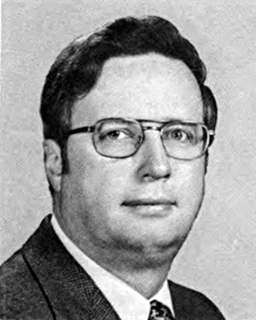
Robert Patrick Casey Sr. was an American lawyer and politician from Pennsylvania. A member of the Democratic Party, he served as the 42nd Governor of Pennsylvania from 1987-95. He previously served as a state senator (1963–68) and Auditor General of Pennsylvania (1969–77).

Raymond Philip "Ray" Shafer was an American attorney and politician who served as the 39th Governor of Pennsylvania from 1967 to 1971. Previously, he served as the 23rd Lieutenant Governor of Pennsylvania from 1963 to 1967 and a Pennsylvania State Senator from 1959 to 1962. He was a national leader of the moderate wing of the Republican Party in the late 1960s.

The Pennsylvania gubernatorial election of 2006 was held on November 7, 2006 and included the races for the Governor of Pennsylvania and Lieutenant Governor of Pennsylvania.
The Republican Party of Pennsylvania, commonly known as the PA GOP, is based in Harrisburg in the United States state of Pennsylvania. It is affiliated with the Republican Party of the United States.
Ernest P. "Ernie" Kline was a Democratic member of the Pennsylvania State Senate and the 25th Lieutenant Governor of Pennsylvania.

The Pennsylvania gubernatorial election of 2002 was held on November 5, 2002, and included the races for the governor and lieutenant governor of Pennsylvania. Incumbent Republican Governor Mark Schweiker, who became Governor in 2001 when Tom Ridge resigned to become Homeland Security Advisor, was eligible to run for a full term, but did not do so. Democrat Ed Rendell, the former Mayor of Philadelphia and Chairman of the Democratic National Committee, emerged from a competitive primary to win the general election against Republican Pennsylvania Attorney General Mike Fisher.

The Pennsylvania gubernatorial election of 1994 was held on November 8, 1994. The incumbent governor, Bob Casey, Sr. (Democrat), was barred from seeking a third term by the state constitution. The Republican Party nominated Congressman Tom Ridge, while the Democrats nominated Mark Singel, Casey's lieutenant governor. Ridge went on to win the race with 45% of the vote. Singel finished with 39%, and Constitution Party candidate Peg Luksik finished third, garnering 12% of the vote.

The Pennsylvania Gubernatorial election of 1990 was held on November 6, 1990. Incumbent Democratic Robert P. Casey easily defeated Republican Barbara Hafer. Governor Casey defeated Ms. Hafer by a margin of 35.29%, and carried 66 out of 67 Pennsylvania counties.

The Pennsylvania Gubernatorial election of 1986 was held on November 4, 1986. Democrat Bob Casey narrowly defeated Republican Bill Scranton III, in a race that featured two very high-profile candidates.

The Pennsylvania gubernatorial election of 1982 was held on November 2, 1982 between incumbent Republican Dick Thornburgh and Democratic U.S. Congressman Allen E. Ertel.

The Pennsylvania gubernatorial election of 1978 was held on November 7, 1978 between Republican Dick Thornburgh and Democrat Pete Flaherty.

The Pennsylvania gubernatorial election of 1974 was held on November 5. Incumbent Democratic Governor Milton Shapp defeated Republican Drew Lewis. Under the state's 1968 constitution, Shapp was the first governor who was eligible to run for consecutive terms.

The Pennsylvania gubernatorial election of 1966 was held on November 8. Republican Ray Shafer, the state's incumbent Lieutenant Governor, was elected to the state's highest office after holding off a charge from future governor Milton Shapp.

The Pennsylvania gubernatorial election of 1958 was held on November 4. Democrat David Lawrence defeated Republican Art McGonigle by a smaller than anticipated margin.

The Pennsylvania gubernatorial election of 1954 was held on November 2. In what is considered a crucial realigning election for the state, Democratic State Senator George Leader defeated Republican incumbent Lieutenant Governor Lloyd Wood by a surprisingly large margin.

The Pennsylvania gubernatorial election of 1950 was held on November 7. For the twenty-second time in twenty-five elections, the Republican candidate was victorious, but by a much smaller than usual margin. Superior Court Judge John S. Fine defeated Democrat Richardson Dilworth, the City Controller of Philadelphia.
The Milton Shapp presidential campaign of 1976 began when then-Governor of Pennsylvania Milton Shapp elected to seek the Democratic Party nomination for President of the United States in the 1976 election. Shapp had won reelection as Governor of Pennsylvania in the 1974 election—the first Pennsylvania Governor to be elected to a second four-year term following an amendment permitting this in 1967—and had hoped to translate his relative popularity in Pennsylvania into the groundwork of a presidential campaign.

The 2018 Guam gubernatorial election took place on Tuesday, November 6, 2018, to elect the Governor of Guam. Incumbent Republican Governor Eddie Baza Calvo was barred from re-election, after his win in 2014, since Guam does not allow governors more than two consecutive terms. The Governor and Lieutenant Governor of Guam are elected on the same ticket. Five candidates officially declared their bids. After the August 25 primaries, the Republican party nominated Lieutenant Governor Ray Tenorio, while the Democratic party nominated former territorial senator Lou Leon Guerrero. Democratic primary second-placer Frank Aguon Jr. initiated a write-in campaign in hopes of becoming Guam's first write-in elected governor.























